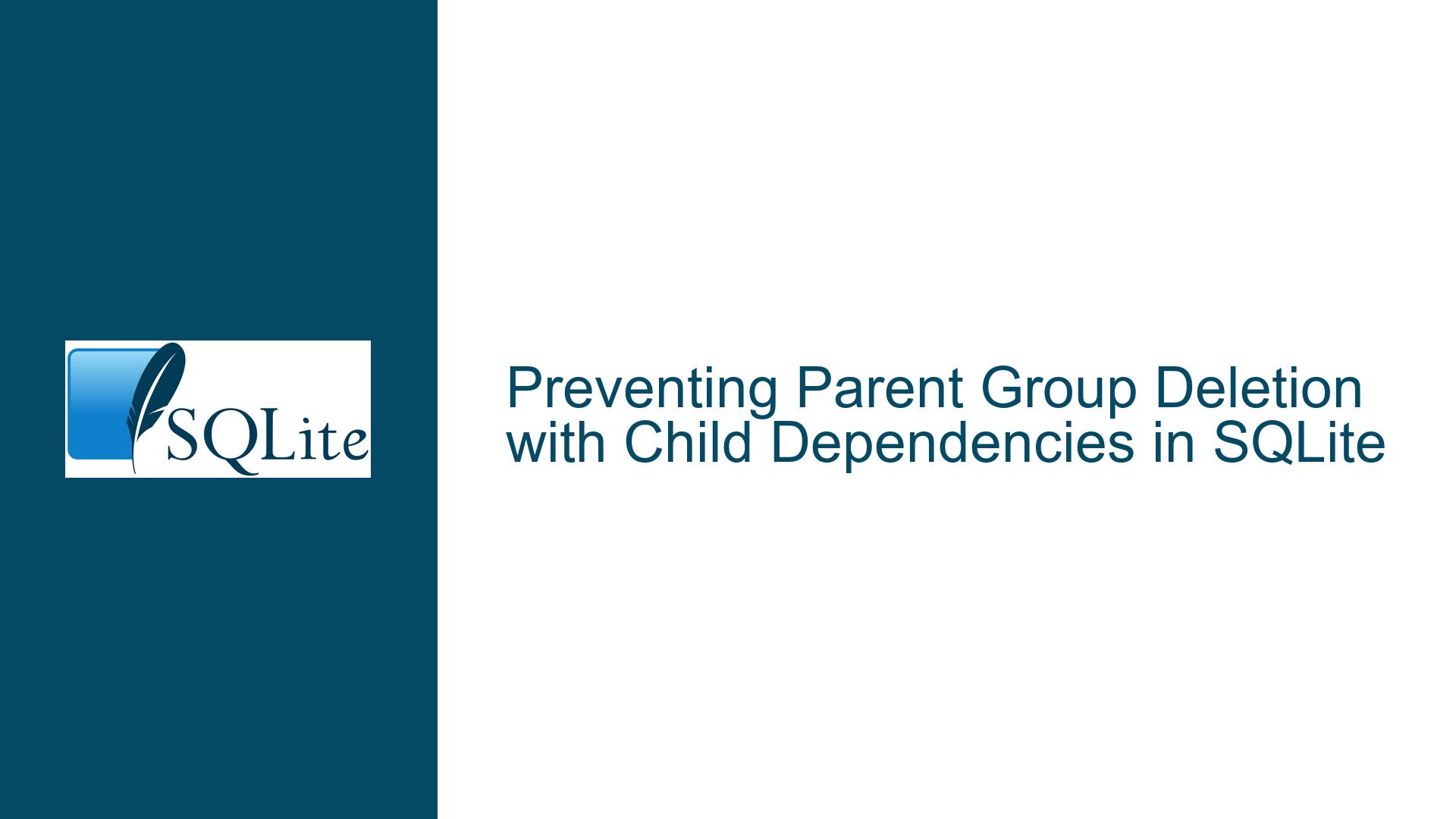Preventing Parent Group Deletion with Child Dependencies in SQLite
Understanding Trigger Syntax Errors and Foreign Key Constraints in Parent-Child Hierarchies
Issue Overview: Syntax Errors in Triggers and Misconfigured Foreign Key Relationships
The core challenge revolves around enforcing referential integrity in a self-referential parent-child hierarchy stored in an SQLite database. The goal is to prevent the deletion of a parent group if it has child groups while ensuring cascading deletion of dependent records in related tables (e.g., grouped_tracks). The user attempted to implement this logic using a trigger with procedural-style IF and CASE statements, which are not valid in SQLite’s trigger syntax. Additionally, the foreign key configuration did not fully leverage SQLite’s built-in referential integrity features, leading to unnecessary complexity.
The groups table uses a pgid column to reference its parent group via gid, forming a hierarchical structure. A FOREIGN KEY constraint is declared between pgid and gid, but it lacks explicit ON DELETE behavior. The initial trigger (delete_group) attempted to check for child groups before deletion and raise an error if any existed. However, SQLite triggers do not support procedural control flow statements like IF or CASE as standalone constructs. Instead, triggers execute SQL statements sequentially, and conditional logic must be expressed through WHERE clauses or SELECT statements with RAISE().
The user’s revised trigger used a WHEN condition to execute the cascading deletion of grouped_tracks only when no child groups existed. While this avoided syntax errors, it did not explicitly prevent the deletion of parent groups with children. The actual prevention of such deletions relied on the foreign key constraint between pgid and gid, which was not configured to enforce this behavior automatically. This misconfiguration led to ambiguity in how deletions were handled and highlighted the need for a deeper understanding of SQLite’s foreign key mechanics.
Possible Causes: Misuse of Trigger Syntax and Incomplete Foreign Key Configuration
Invalid Procedural Logic in Triggers:
SQLite triggers operate within a restricted SQL dialect that excludes procedural extensions likeIForCASEas control flow statements. Attempts to use these keywords as standalone constructs result in syntax errors. Conditional logic in triggers must be expressed through SQL statements such asSELECT ... WHEREcombined withRAISE(FAIL, ...)to abort operations.Missing
ON DELETEClause in Foreign Key:
The foreign key constraint betweenpgidandgidin thegroupstable was declared without anON DELETEaction. By default, SQLite appliesON DELETE NO ACTION, which aborts deletions if dependent child records exist. However, this behavior is contingent on foreign key enforcement being enabled at runtime viaPRAGMA foreign_keys = ON;, which is not mentioned in the discussion. If foreign keys are disabled, the constraint is ignored, allowing deletions to proceed even with child groups.Incomplete Cascade Handling for Dependent Tables:
Thegrouped_trackstable stores associations between groups and tracks. The trigger attempted to delete these records when a group was deleted, but this logic was decoupled from the foreign key constraints. A more robust approach would useON DELETE CASCADEin the foreign key definition ofgrouped_tracks.group_id, ensuring automatic deletion without requiring a trigger.Trigger Timing (
BEFOREvs.AFTER):
The initial trigger usedAFTER DELETE, which executes after the row has been removed from the database. At this stage, it is too late to prevent the deletion of a parent group with children. Switching to aBEFORE DELETEtrigger allows the logic to execute before the deletion occurs, enabling the trigger to abort the operation by raising an error.
Troubleshooting Steps, Solutions & Fixes: Correcting Trigger Logic and Foreign Key Setup
Step 1: Enable Foreign Key Enforcement
SQLite does not enforce foreign key constraints by default. Add the following pragma at the start of every database connection:
PRAGMA foreign_keys = ON;
This ensures that all foreign key constraints, including ON DELETE rules, are respected.
Step 2: Define Foreign Keys with Explicit ON DELETE Actions
Modify the table definitions to include ON DELETE clauses that enforce the desired behavior:
CREATE TABLE groups (
gid INTEGER PRIMARY KEY AUTOINCREMENT NOT NULL,
pgid INTEGER DEFAULT 0 NOT NULL REFERENCES groups(gid) ON DELETE RESTRICT,
name TEXT NOT NULL,
CHECK(LENGTH(name) > 0 AND gid >= 0 AND pgid >= 0
AND ((gid = 0 AND pgid = 0 AND name = '*ROOT*') OR (gid <> pgid)))
);
CREATE TABLE grouped_tracks (
group_id INTEGER NOT NULL REFERENCES groups(gid) ON DELETE CASCADE,
track_id INTEGER NOT NULL,
PRIMARY KEY (group_id, track_id)
);
ON DELETE RESTRICTongroups.pgid: Prevents deletion of a parent group if it has child groups.ON DELETE CASCADEongrouped_tracks.group_id: Automatically deletes track associations when their group is deleted.
Step 3: Simplify or Eliminate Triggers
With proper foreign key configuration, the delete_group trigger becomes redundant. Remove it entirely to avoid unnecessary complexity:
-- No trigger needed; ON DELETE CASCADE handles grouped_tracks cleanup.
Step 4: Handle the Root Group Exception
The root group (gid = 0) is a special case that references itself. To allow its creation without violating the foreign key constraint during initial insertion, use a deferred constraint check:
PRAGMA defer_foreign_keys = ON;
INSERT INTO groups (gid, name) VALUES (0, '*ROOT*');
PRAGMA defer_foreign_keys = OFF;
Step 5: Validate the Schema with Test Cases
Attempt to Delete a Parent Group with Children:
DELETE FROM groups WHERE gid = 1; -- Assuming group 1 has childrenThis should fail with an error:
FOREIGN KEY constraint failed.Delete a Childless Group:
DELETE FROM groups WHERE gid = 2; -- Assuming group 2 has no childrenThis should succeed and automatically remove associated records from
grouped_tracks.Verify Root Group Deletion Prevention:
DELETE FROM groups WHERE gid = 0;This should fail due to the
CHECKconstraint requiringgid = 0to havepgid = 0andname = '*ROOT*'.
Step 6: Add Indexes for Performance
Create indexes on foreign key columns to optimize constraint checks and cascading deletions:
CREATE INDEX idx_groups_pgid ON groups(pgid);
CREATE INDEX idx_grouped_tracks_group_id ON grouped_tracks(group_id);
Step 7: Fallback Trigger for Custom Error Messaging (Optional)
If a custom error message is required when attempting to delete a parent group with children, use a BEFORE DELETE trigger with a SELECT RAISE() statement:
CREATE TRIGGER prevent_parent_deletion BEFORE DELETE ON groups
FOR EACH ROW
WHEN (EXISTS (SELECT 1 FROM groups WHERE pgid = OLD.gid))
BEGIN
SELECT RAISE(FAIL, 'Cannot delete a group that has children');
END;
This trigger fires before deletion and raises a descriptive error if child groups exist. Note that the foreign key constraint with ON DELETE RESTRICT will still block the deletion independently, making this trigger optional unless custom messaging is critical.
Summary of Key Fixes
- Foreign Keys Over Triggers: Leverage SQLite’s native foreign key constraints with
ON DELETE RESTRICTandON DELETE CASCADEinstead of procedural triggers. - Trigger Syntax Correction: Use
SELECT RAISE(FAIL, ...)within triggers for conditional error raising. - Index Optimization: Ensure foreign key columns are indexed to maintain performance during constraint checks.
By addressing the root causes—misconfigured foreign keys and invalid trigger syntax—this approach ensures robust enforcement of parent-child integrity while minimizing the risk of runtime errors and performance bottlenecks.






